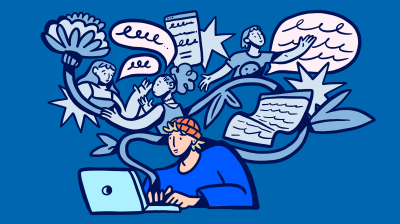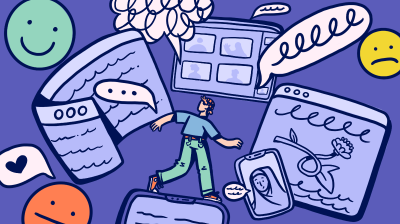How to build new coping skills
Learn about what coping is, the different types of coping strategies, and how to know if the strategies you’re using are working for you.

Coping is what you do to protect your mental and emotional health when you’re experiencing stress. Everyone has their own ways of coping, and people use different coping strategies depending on the situation they’re in. A coping strategy is a behaviour or a way of thinking that helps you manage stress.
Some coping strategies can be more helpful and effective than others. Coping strategies also often come with side effects, some of which can make life easier, while others can cause problems. Taking time to reflect on the coping strategies you’re using in different situations can help you find the right strategies for you and support your mental wellbeing.
What is coping?
When you experience pressures and challenges in your life, your body responds with stress. Coping is your mind’s way of handling this stress. Lots of different situations can cause you to experience some degree of stress. Some sources of stress can be severe, while others can be milder. Sometimes stress will be short-lived, but it can also last for a prolonged period. Often, a situation may feel stressful if it requires you to adjust or adapt in some way. Because of this, change usually comes with some stress.
Change can often be a good thing. For example, making new friends, starting a new job, or moving house can all cause stress, but they can also be exciting, fulfilling and help you to grow as a person. While stress can be unpleasant, and being overwhelmed by stress can have a significant impact on your mental health and quality of life, having ways of managing life stressors such as these helps you to grow and live the life you want to live.
Coping isn’t an event, it’s a process. There is a very broad range of things that people do to help cope, and people often use a collection of different coping strategies in response to a single stressful event. You may be aware of using certain coping mechanisms, while other coping mechanisms might be unconscious. Learning to recognise how you respond to stress, including your own unique coping mechanisms, is an important part of managing your mental health.
Coping mechanisms can be grouped into a number of coping styles. The style of coping mechanism people use will often vary depending on the type of situation they’re facing. Different people also tend to have particular styles of coping that they’re most comfortable with and will use more often.
First, coping mechanisms can be either problem-focused or emotion-focused.
Problem-focused coping
Problem-focused coping strategies aim to reduce stress by solving the problem causing the stress in the first place. If a person feels like they have the ability to influence the situation they’re in, they’re more likely to cope in this way. Some examples of problem-focused coping are:
- Making a plan
- Asking for help
- Establishing boundaries
- Learning more about the problem
- Breaking the problem down into smaller tasks
Emotion-focused coping
Emotion-focused coping strategies aim to reduce the feelings of distress that are caused by the stressful situation. A person is more likely to use emotion-focused coping if they feel like the situation they’re facing is out of their control. Some examples of problem-focused coping are:
- Talking about how you’re feeling
- Humour
- Finding the positives
- Journaling
- Meditation
- Expressing emotions
- Reframing how you see the problem
Coping strategies can also be either action-focused or avoidance-focused.
Action-focused coping
Action-focused coping describes coping mechanisms that involve paying attention to the source of stress and how it’s impacting you. Similar to problem-focused coping, if a person feels like they have the ability to influence the situation they’re in, they’re more likely to use action-focused coping. Some examples of action-focused coping are:
- Making a plan of action
- Talking through solutions with other people
- Getting advice from others
- Reframing how you think about the situation
Avoidance-focused coping
Unlike action-focused coping, avoidance-focused coping describes coping mechanisms that involve ignoring or avoiding the source of stress and how it’s impacting you. A person may use avoidance-focused coping if the source of stress makes them feel threatened, overwhelmed or in danger. People also use avoidance-focused coping for many other reasons. Often, people choose to avoid a stressful situation because they get short-term relief. Some examples of avoidance-focused coping are:
- Avoiding the source of stress
- Avoiding things that remind you of the source of stress
- Distracting yourself from what you’re feeling
- Numbing your emotions
- Isolating from friends or family
‘Good’ vs ‘bad’ coping strategies
When people talk about coping, they often use terms like ‘good’ coping mechanisms and ‘bad’ coping mechanisms. Talking about coping in this way can be problematic for a few reasons.
First, it over-simplifies coping. When you engage in an action to help deal with stress, that action often has short-term and long-term effects on the situation you’re in, your mental state, and your life. Some of these effects will be helpful and make things easier for you, while others might be limiting. You can’t separate coping mechanisms into all good and all bad because each mechanism comes with its own unique combination of pros and cons for that specific situation.
Second, labelling a coping mechanism as ‘bad’ creates shame around it and can cause people who depend on that way of coping to believe that they’re a bad person for doing so. The coping strategies you reach for to deal with stress, fear, and trauma do not make you a better or worse person.
The reality is that behaviours like comfort-eating, drinking alcohol, and self-harming are ways people might use to cope, just like problem-solving and talking to someone. They all serve a purpose in helping us get through life’s difficulties. When people reach for coping mechanisms with potentially harmful side-effects, they usually do so because they believe these strategies are the only options available to them in the moment.
Not all coping mechanisms are created equal. Some may provide you with relief in the moment, while causing other problems or issues later in life. Striving to cope with stress in ways that allow your health and wellbeing to flourish is a positive thing, but it is also important to be patient and kind with yourself in the process. Similarly, if there’s someone in your life whose coping mechanisms are causing problems for them, they are equally deserving of patience and kindness.
Telling someone their coping strategy is ‘bad’ and that they should stop without recognising that it serves a purpose for them and helps them cope isn’t helpful. It can leave them feeling judged and unsupported. It can be immensely difficult to let go of a problematic coping mechanism if there isn’t an alternative coping strategy with fewer negative side-effects available. Expecting someone to make this change without offering support or understanding can cause additional distress.
How to learn new coping strategies
It’s difficult to stop using a coping strategy if you don’t have an alternative to replace it with. If your current ways of coping are causing issues in your life, it can make you feel stuck. You may have developed your current coping styles earlier in life and the idea of changing now can be daunting.
Fortunately, you can add new strategies to your coping toolkit at any time. Coping strategies are a type of skill. You can learn new ones and get better at using different strategies by practising them. As you expand your coping toolkit, you can respond to stress in more flexible ways and find the most appropriate strategy to meet the demands you’re facing. This process can be difficult and feel uncomfortable at first, but if you want to explore some alternative ways of coping, here are some techniques you can try:
Find what you can control
If a situation you’re facing is causing you stress, start by finding the parts of the situation that you can control, and the parts that are outside of your control. This will help you to identify what coping strategies will work best given the challenge you’re dealing with.
For example, if you have an exam coming up, you can’t control the questions that will come up on the test, or how exactly you will feel when you’re in the exam room. However, how you prepare for the exam remains within your control. For the bits you can control, problem-focused strategies like making a study plan, asking your teachers or lecturers for advice and tips, and making sure you get enough sleep can all be helpful strategies to use. Emotion-focused coping can help you to manage the feelings associated with the aspects of the challenge that you can’t control. You might talk to your classmates about your worries or pick up some mindfulness exercises to help stay calm during the exam itself.
Sometimes in life, you will face situations that are totally out of your control, like losing a loved one. During these times, finding ways to understand, process, and ease the emotions that the experience brings up can help you through. This might involve things like taking time for yourself when you need it, sharing how you’re feeling with someone you trust, or doing things that you enjoy or calm you. Read more about how to regulate your emotions.
Practice mindfulness
Stress can send your body into survival mode. This can cloud your thinking and make it difficult to make decisions or figure out what to do next. When you’re in this state, it can really limit the number of coping mechanisms you have the capacity to use. Mindfulness can help clear your head and make it easier to cope.
Mindfulness is the ability to be aware of what’s happening in the present moment, both inside of your body and in the world around you. Mindfulness encourages you to be aware of your thoughts and feelings without judging them and without getting lost in them. This can help you view yourself and your situation from new perspectives.
Practising mindfulness doesn’t have to be complicated or time-consuming. Read our article on simple mindfulness exercises if you would like to build a mindfulness routine of your own.
Problem-solving
Stress often acts as an alarm system in your brain to make you aware of something that you need to respond to in some way. It’s a mental tool that can help you overcome obstacles. For example, you might feel stressed because you have an important deadline coming up at work. This stress response can help motivate you to take action and complete the task on time.
Building your problem-solving skills can help you respond to stress more effectively. Life is full of challenges, and no two challenges will be exactly the same. Each challenge you face requires a unique response, so it can be tricky to describe problem-solving in a way that works for every situation. Instead, here are some things to keep in mind when you’re trying to solve a problem.
- Explore the problem: Start by getting a full picture of the issue you’re facing. When you’re stressed, your mind sometimes jumps to conclusions and fills in the blanks of the situation. Start by taking a step back and collecting all the information you can before responding.
- Explore your options: Stress can cause you to take action quickly, but your first instinct might not be the best way to handle the problem you’re facing. Think about the different actions you could take and the pros and cons of each before deciding what to do next.
- Try things out: Problem-solving is a process. The first thing you try won’t always have the outcome you expect. It’s important to be flexible in how you approach new challenges and allow yourself to try out different solutions.
- Don’t fear ‘failure’: If you try to overcome an obstacle and don’t succeed on your first attempt, it can be discouraging. This is an understandable reaction, but don’t let these feelings cause you to give up. If you try to solve the problem and it doesn’t work out, think of it as a learning experience instead of labelling it as a ‘failure.’
- Trust your ability: Believing in yourself and your abilities is an important part of overcoming challenges in life. If you don’t think you’re capable of handling a problem, you’re less likely to try and solve it in the first place. A lot of people underestimate their abilities, but there are things you can do to build self-belief. Read our article on how to improve your self-esteem if you would like to learn more.
Reach out for support
Coping is not something you have to do alone. Reaching out for social support is a powerful coping tool. Other people can help you see things from different perspectives, they can offer you empathy and comfort, and they can help you overcome obstacles you’re facing. Having the ability to self-regulate and meet your own needs is a valuable skill-set for navigating life’s challenges, but connecting with the people in your life, and allowing them to give you care and support, is also a powerful coping mechanism.
You aren’t weak and you haven’t failed if you ask for help. Humans have evolved to form communities where the members help meet each other’s needs, and you deserve to be part of a community that can help meet your needs.
How working with a therapist can help
If your coping mechanisms are making life more difficult for you, it can be challenging, distressing, and sometimes even dangerous to let go of them on your own, especially if you are using them to cope with traumatic events or mental health issues. Professionals who are trained in evidence-based therapies like Cognitive behavioural therapy (CBT) can introduce you to alternative coping mechanisms that are appropriate for your unique situation. They can also support you to replace your existing coping mechanisms with new alternatives gradually, in safe and structured ways.
There are many different types of evidence-based talk therapies, and what works well for someone else might not be the best approach for you. If you are thinking about starting therapy to help with coping, explore the different types of therapy that are available to you and don’t be discouraged if your first experience isn’t the best fit. Therapy is a very personal thing, and it can take time to find the right therapy for you.
Feeling overwhelmed and want to talk to someone?
- Get anonymous support 24/7 with our text message support service
- Connect with a trained volunteer who will listen to you, and help you to move forward feeling better
- Whatsapp us now or free-text SPUNOUT to 50808 to begin.
- Find out more about our text message support service
If you are a customer of the 48 or An Post network or cannot get through using the ‘50808’ short code please text HELLO to 086 1800 280 (standard message rates may apply). Some smaller networks do not support short codes like ‘50808’.






